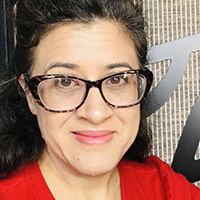Coverage and Interviews
Saskia Hendriks In this interview, Saskia Hendriks of the U.S. National Institutes of Health describes the neuroethical factors involved in her research and the session she headlined titled 'Life and Health Decisions with Experimental Brain Implants' on October 23, 2020. Interview by Kimberley Glover. What is your field(s) of research? I work for the National Institutes of Health as a bioethicist. My field of research focuses on the ethics of emerging medical technologies, with sub-specialties in reproduction, and neuroscience. What are some of the main neuroethical issues in your fields of research? There are two major domains of issues. The first domain involves research ethics for emerging medical technologies, specifically: how can clinical research be ethically conducted using these technologies? Clinical trials involving emerging technologies can raise new ethical questions or require interpreting/specifying existing bioethical guidance. The second domain involves the implications of these new technologies, both during and after the research process. What are the effects and implications of these new tools on patients, social groups, and society at large? I think most technologies, medications, and diagnostics can very well be used in a way that is consistent with social values, but sometimes it’s helpful to consider how we might promote this as these technologies are being developed. Why are these neuroethical issues important for the wider world? There are numerous devastating neurological and psychiatric conditions that don’t have treatments that work for all. Not only are we trying to better understand the brain, but we’re also trying to see if there are ways to intervene that ameliorate these conditions. Importantly, changes that we might be able to induce in the brain can have a different meaning than changes that can be induced in other organs of the body. Beyond these potential impacts on patients, our ability to better understand the brain allows us to learn more about important concepts of self, such as agency, identity, or autonomy. These are such essential concepts of the human condition, so increasing our understanding of them can have wide-ranging implications. Describe the session that you are participating in. This session — 'Life and Health Decisions with Experimental Brain Implants' — will address what happens to patients who participate in clinical trials involving invasive neural devices. What happens to these patients after the trial ends? Can these individuals keep their neural device, and if so, how will they be supported by researchers and others involved in the research process? If they benefited from the device, how will their long-term care be supported? These are the types of questions we want to raise during the session. What first got you interested in neuroethics? I am trained as a physician, so I have always been fascinated in how the human body works. I’d become especially fascinated by the brain, with its remarkable functions and capabilities. I also developed an increasing interest in the ethical issues surrounding medicine, medical research, and innovation. My interests ultimately converged, which led me to neuroethics. Why are you involved with the INS? The INS provides valuable opportunities to collaborate and share your ideas, research, and questions in neuroethics, which I feel is a major motivating factor for getting involved and attending the meetings. I’m often very inspired by the exciting work being presented at the meetings. What aspects of the annual meeting are you most excited about? I’m looking forward to participating in the concurrent session on experimental brain implants with my fellow panel members. I’m interested in hearing their insights on this important topic, and how neuroethics can help further our understanding of this issue. I’m interested in several topics on the meeting agenda, including the main focus of the meeting: neural data andAI. AI is a fascinating field, so I’m interested in hearing more about the different uses of AI technologies. Given the unique circumstances of this year, I’m also particularly interested in hearing about the impact of COVID-19 on health care ('Neuroethics in a Time of Crisis') and focusing on justice-related topics in neuroethics. Why do you think people should attend the annual meeting? If you are interested in neuroethics, I think the annual meeting provides an excellent opportunity to explore exciting work being done in the field. I strongly believe that neuroethical discourse should be firmly grounded in scientific and clinical actuality. I hope we'll have a good number of clinicians and scientists attending the meeting, as this can provide valuable opportunities to connect and collaborate. Fostering communication among ethicists, clinicians, and scientists is important. The 2020 INS Annual Meeting will convene virtually on Thursday and Friday, October 22-23, 2020. Sessions will address the many areas in which brain technologies and data concerning the brain are developed, deployed, utilized and regulated. We hope you will attend! Meeting ProgramJohn MeixnerThis conversation between Professor Francis Shen and Dr. John Meixner — Assistant United States Attorney, Major Crimes Unit, United States Attorney’s Office, Eastern District of Michigan — touches on the topics that will be discussed in the 2020 INS Annual Meeting session on: 'Policing, Neurotechnology, and the Search for Truth.' / Vimeo / Transcript Robin PalmerThis conversation between Professor Robin Palmer and Professor Francis Shen touches on the topics that will be discussed in the 2020 INS Annual Meeting session on: 'Policing, Neurotechnology, and the Search for Truth.' Transcript / Vimeo Akemi Osugi This Q&A between Akemi Osugi and Professor Francis Shen is part of the 2020 INS Annual Meeting session: 'Policing, Neurotechnology, and the Search for Truth.' Dr. Osugi is an associate professor as faculty of Human Culture and Sciences in the Department of Psychology at Fukuyama University. Learn more about Dr. Osugi’s publications. Q: Please briefly describe your affiliations and roles. I’m an associate professor of Investigative Psychology at Fukuyama University. I was formerly a polygraph examiner for the Japanese police and contributed to criminal investigations in the field by using the Concealed Information Test (CIT). My continuing professional interests are the development of the scientific memory detection technique for the field and engagement between researcher and practitioner communities not only in Japan but also in other countries. I’ve conducted several research projects mainly on the relationship between the ERP-based CIT and emotion, and I’ve also offered lectures and trainings about practical CIT usage in Japan to foreign practitioners in order to share my experiences and expertise for better polygraph usage in the world. Q: Can you please describe how you became interested in your research and what the ultimate goals of your research are? When I was a child, I liked to watch police TV drama and yearned to fight crime with science. When I was a university student, I knew that the polygraph examination was being uniquely developed in Japan and that this technique could help criminal investigations in the field. I felt sure that the research on the CIT would help investigations more, thus I started my research on the CIT by adding my individual interest on emotional arousal. After that, I worked at the police forensic science laboratory and experienced the real field by conducting polygraph examinations on a daily basis. Because I believe that further research and engagement between researchers and practitioners would help further development of the CIT and other polygraph techniques in the world, I changed my career. My ultimate goals are to promulgate an understanding of the CIT by correcting common (public) misunderstandings, to make the polygraph examinations for the criminal investigations in the world improve simply and scientifically, and to establish the scientific investigation system including the CIT to reduce crime. Q: What types of information detection technology do you use, and how have you conducted research in the lab and in the field? I have conducted polygraph examinations using the Autonomic-Nervous-System-based Concealed Information Test (CIT) in the field. It’s to be noted that the CIT in Japan has slightly different features from the typical CIT, especially on the judgment. This point always makes our discussion complicated. My main research has been conducted using the Event Related Potential (ERP) in the lab. Most of them are conducted on P300-based CIT. Q: How have law enforcement / police / government reacted to, and if applicable, utilized your methods and technology? In Japan, polygraph examinations are conducted only by the ANS-based CIT. Police investigators use this method by requesting the polygraph examiner to gather valuable information for their investigations, and the examiner judges only whether or not the examinee has information (pieces of memories) related the crime. The result of polygraph examination conducted by the CIT is admissible as evidence at trials in Japan, though probative value is still not high for various reasons. In addition, the CIT using ERP and other indices is not currently used with the polygraph examination in the field. Q: Can you please describe any concerns you have about the ethical, legal, and social implications of your work and the use of memory-detection technology? At first, polygraph examinations are often misunderstood and people seldom have the correct comprehension because we have a lot of methods using polygraph apparatus. The CIT is often compared to the Comparison Question Test (CQT), and this difference is obvious for the researchers and practitioners but not for the public and the law enforcement (court). Moreover, the CIT in Japan is also different from the typical CIT, and this difference is not well-known even for the researchers and practitioners except those in Japan. I think we need to share this information and understand more about this method to improve it scientifically and practically. To scientifically judge the individual (not group) using the physiological data is difficult in the field. We are still looking for an appropriate way to do it in the field. Q: What do you see as the future use of concealed information tests in the law and in police investigations? To use the method effectively and correctly, we, including researchers, practitioners, police investigators, and law enforcement, have to completely understand the possibilities and limitations of the CIT. We need to control the information throughout the criminal investigations including investigators’ interrogations, media coverage, and examiners’ pre-interview, to prevent the information leakage problem. Better scoring systems or appropriate statistical methods are needed to reduce errors, and to reveal the entire mechanism during the CIT is also an important challenge. To be more a scientific tool, it’s also important to improve the quality of the examiners and the equipment more, including finding or adding new indices. Q: Is there anything else you would like our audience to know? Truth is stranger than fiction. Because there are a lot of crimes that would be hard to imagine, investigators’ assumptions sometimes don’t work well. The CIT in Japan with Searching Questions is the information-gathering technique. By using this method, we can identify which information (alternative) would be related to the crime from various possibilities (alternatives). Investigators and examiners should keep all pieces of information which was revealed from the former investigations in his/her mind, and think up all possibilities from these without prejudice. I believe composing good CIT questions definitely can help the investigations a lot. The 2020 INS Annual Meeting will convene virtually on Thursday and Friday, October 22-23, 2020. Sessions will address the many areas in which brain technologies and data concerning the brain are developed, deployed, utilized and regulated. We hope you will attend! Meeting ProgramAnna Wexler Co-chair, INS Program Committee The Rapid Growth — and Insufficient Oversight — of the Direct-to-Consumer Neurotechnology IndustryWhat is your field of research? My work focuses on emerging technologies, neurotechnology, do-it-yourself science, and direct-to-consumer medicine/science. What are some of the main neuroethical issues in your fields of research? I'm interested in the neuroethical issues that arise when neurotechnology gets adapted or co-opted in ways that researchers do not expect, and how advances are translated into the world outside of mainstream medical pathways. There are also very interesting issues that arise related to consumer neurotechnology and the commercial development of neurotechnology, since that translation often occurs outside of biomedical and bioethical norms. Why are these neuroethical issues important for the wider world? I feel that these neuroethical issues are particularly important for the wider world because consumer neurotechnology involves products that are being marketed directly to consumers and may come into the hands of the public without significant regulatory oversight. It's unclear what consumers understand about these technologies and how they interpret companies' marketing language. Describe the session that you are participating in. This session — 'Charting the Path to Ethical Neurotechnology' — is interesting because in neuroethics, many people have written about direct-to-consumer neurotechnology, but there has not been much engagement with the neurotechnology industry. The motivation for this session is to reach out to those in the neurotechnology industry to engage in conversation about the ethical development of neurotechnology products. Many bioethicists are wary of working or consulting with industry due to potential conflicts of interest, and as ethicists, it's unclear how we navigate these issues. How can we engage with the neurotechnology industry in more productive ways? What are their ethical concerns, and how can we, as neuroethicists, work with industry? These are just a few questions we want to raise during the session. What first got you interested in neuroethics? Since my undergraduate education, I've always been interested in the broader questions regarding advances in brain science. However, I didn't know there was a field called 'neuroethics.' It was only through my doctorate work, which focused on the do-it-yourself brain stimulation community, that I found others who were working in neuroethics. Throughout the course of writing and publishing on DIY brain stimulation, I found myself engaging and interacting more and more with neuroethics. Why are you involved with the INS? It's fantastic to have a professional society that brings people together who are interested in the same topic, who are doing great scholarship in the field, and who can offer feedback on ongoing work and ideas. With in-person meetings, I enjoy seeing and engaging with friends and colleagues. There are also numerous opportunities to present your own work and get helpful feedback on research-in-progress. It's an excellent outlet for collaboration and networking. What aspects of the annual meeting are you excited about? The most exciting aspect of this year's virtual meeting is that archival material will be made available on the INS website. With the concurrent sessions that typically run during our in-person meetings, you have to choose which session to attend, which means that you miss out on the other concurrent session(s). Also, it felt like there was never enough time to see all the posters. I think the greatest benefit of the virtual format is that you can watch archival video of all the concurrent sessions, and read the posters on your own time. Why should people attend the annual meeting? I think it's particularly valuable to attend this year's meeting at a time when many of us have been disconnected from our colleagues and collaborators. Due to COVID-19, there has been a distance from those we might normally see when traveling to in-person events during a “normal” year. I view this year's meeting as a way to bring people together, for colleagues to interact, and to learn about each other's research . It's especially important for the neuroethics community to come together and connect with each other, particularly during such difficult times. (Interview by Kimberley Glover) Nicole Martinez-Martin Co-chair, INS Program Committee The Ethics of Digital Mental Health Technology and Its Ramifications for Criminal Justice and Healthcare SystemsWhat is your field of research? My field of research focuses on the ethics of digital mental health technology, which includes mental health applications and a range of predictive technologies and AI tools that are used in the areas of psychiatry and mental health work. More broadly, I have been interested in emerging technologies and their applications to issues related to mental health, including the criminal justice system and the application of such technologies to vulnerable and minority populations. What are some of the main neuroethical issues in your fields of research? There are a range of neuroethical issues related to mental health technology. There are issues that receive greater attention, such as privacy and data protection. There are also issues regarding how mental health technologies can impact populations differently based on race, ethnicity, and gender, which are of particular importance for tools using A.I. and within scientific/health research. For example, when formulating a predictive A.I. tool for mental health, one needs to consider whether there was diversity in the research population, how these tools may be implemented within particular power structures at local levels, what kind of decisions are made using the tools, and how to interact with these tools so that they don't produce further inequities. Some wider concerns include issues with trust, which can impact the ultimate effectiveness of tools and determine whether they can be used to the benefit of clinicians, patients, and other users. Why are these neuroethical issues important for the wider world? At a societal level, the major issue is how different emerging technologies can impact key areas of society, most notably the criminal justice system and the healthcare system. Within these systems, there are existing inequities and problems that need to be addressed. It's important to ensure that these technologies do not exacerbate existing inequities or disparately impact treatment for different groups. My interest in the field largely stems from the fact that mental health is an area that impacts such a large percentage of the population at some point in their lives. There are often inadequate resources to address it and unfortunately, many people with mental health issues wind up in the criminal justice system or shouldering many social burdens throughout their lives. When there are practices/tools that can alleviate those burdens, it's important to ensure that they're being implemented in an ethical manner in order to emphasize benefits and minimize risks. Describe the session that you will be moderating. This session — 'Charting the Path to Ethical Neurotechnology' — invites representatives from the neurotechnology industry to engage in conversation about the ethical implementation and development of neurotechnology products, making for a more inclusive development process. This session was designed to help us navigate the path of consumer and academic collaboration and showcase how effective multidisciplinary collaboration can help engage different stakeholders. What first got you interested in neuroethics? During my time in law school, I did criminal defense work, where my first clients involved those with severe mental illnesses. That experience was as impactful as it was devastating; it showed what can happen in our society when there is inadequate support for those with severe mental illnesses. This led me to obtaining a doctorate in the social sciences, since I was interested in how social structures and attitudes impact how mental health is addressed and how it unfortunately sends such a large amount of people into the criminal justice system. As I began to explore this issue more deeply, I became interested in neuroscience and how it could potentially allow for improvements in how mental health is perceived and addressed in both criminal justice and healthcare contexts. That is the thread that led me to finding a home in neuroethics to further explore these topics. Why are you involved with the INS? Based on my interests in criminal justice and neuroscience, I had been following the work of several people that happened to be leaders in the INS for a while, such as Nita Farahany and Hank Greely. This led me to begin exploring what the INS had to offer and to start attending the annual meetings. I feel the INS provides valuable opportunities to meet and collaborate with others who were doing work in areas of interest to me. What aspects of the annual meeting are you excited about? I'm excited about many aspects of this year's meeting. We went into this year with a theme of 'Our Digital Future: Building Networks Across Neuroscience, Technology and Ethics,' which provided a great deal of interest in exploring potentially transformative technologies for society and for people's lives, such as the use of AI tools in psychiatry or neurotechnology within the criminal justice system. This year, I think it is very special that we have the opportunity to respond to current events within society. There will be a panel focused on the impact of COVID-19 on neuroethics ('Neuroethics in a Time of Crisis'). An issue that I think is very important is examining the intersection of neuroethics and social justice in the wake of the George Floyd protests. We thought it was particularly important to have a conversation about diversity and how neuroethics can contribute to work related to social justice. There will be a main panel that will be discussing that in terms of neuroethics in the disciplines. We made the work to embrace that and bring that in on several panels as a dimension of the topics were going to explore. Why should people attend the annual meeting? For the first time, the annual meeting will be going virtual. This virtual format gives us the opportunity to embrace the potential of technology to bring people together, especially those who may not have been able to attend under normal circumstances. Meetings can be expensive and time consuming! I think the unprecedented circumstances of this particular year are pushing professional societies to take advantage of virtual platforms. I think this virtual format will help open the meetings to people at various professional stages, in and outside of the profession, to come share their thoughts, research and questions. The virtual format provides a wonderful opportunity to hold this year's meeting on a truly international/global scale. We have built in several opportunities for attendees to participate and interact with others, which will make for a very exciting meeting. I think people should take this opportunity to attend the meeting, explore all the exciting topics, and engage with others doing amazing work in neuroethics across the globe. (Interview by Kimberley Glover) Why attend? |
